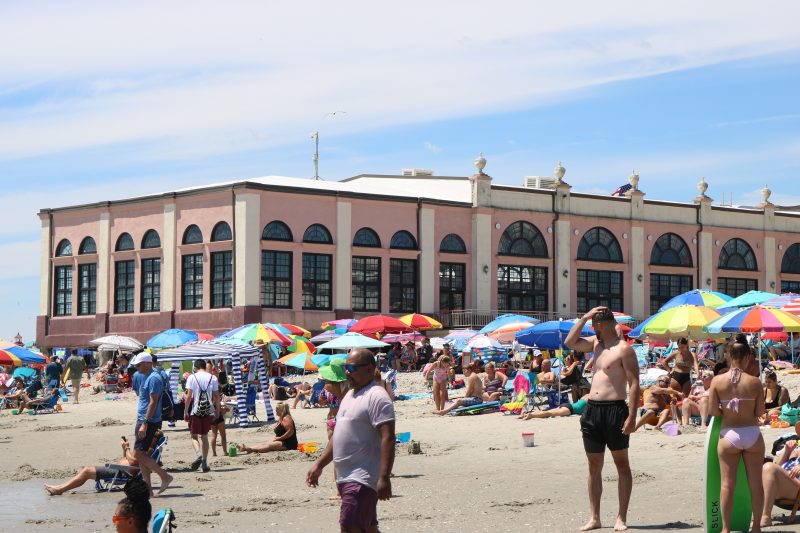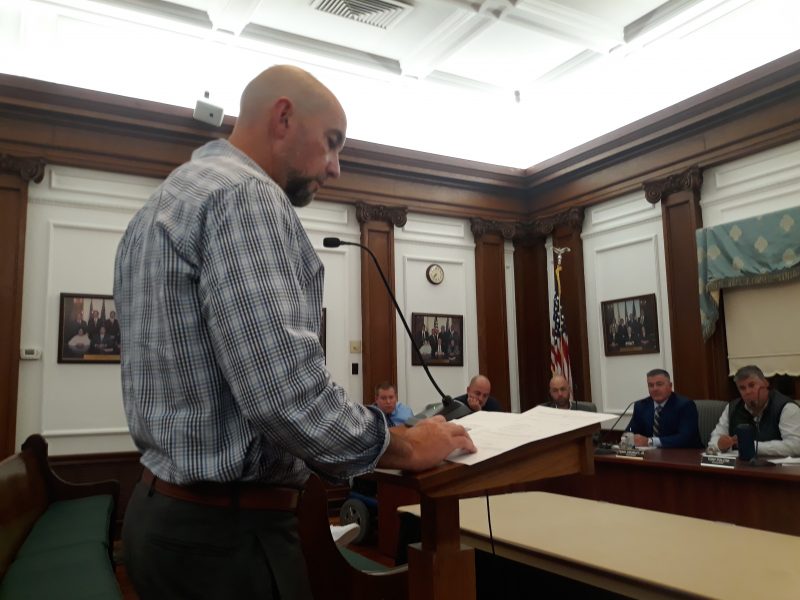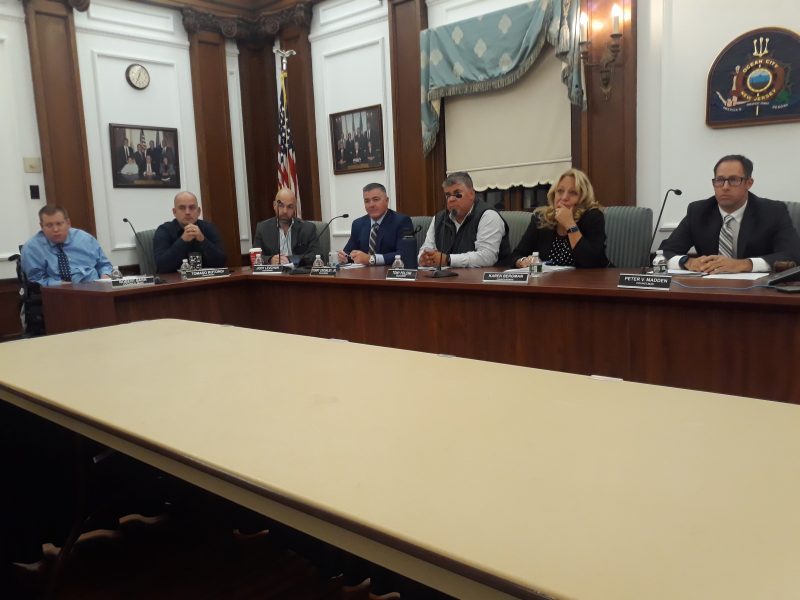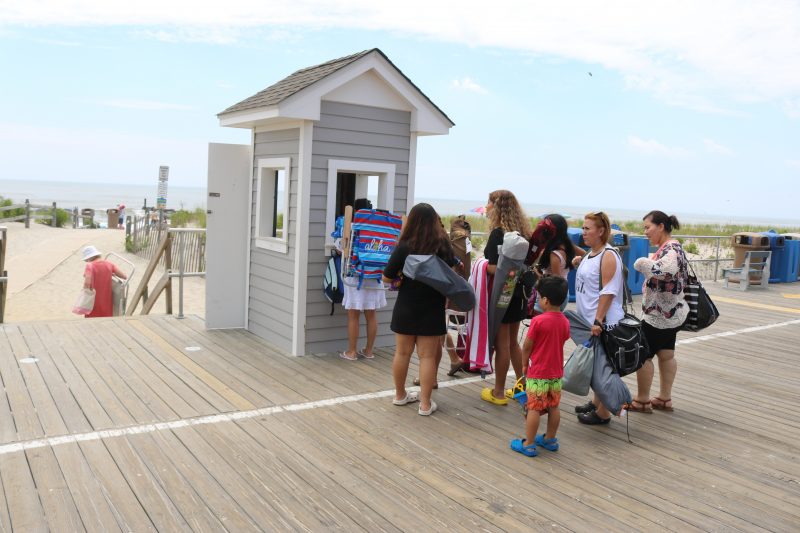City Council votes 7-0 to raise beach fees.
 By DONALD WITTKOWSKI
By DONALD WITTKOWSKI
Beach tags are going to be more expensive in Ocean City for the 2023 summer tourism season.
Voting 7-0 at a meeting Thursday night, City Council approved an across-the-board price increase for seasonal, weekly and daily beach tags as part of plans to raise more revenue to maintain the resort’s sprawling seven-mile shoreline.
Under the plan, the cost of seasonal beach tags will rise from $25 to $35 if they are purchased June 1 or later. The city will continue to offer a preseason discount on seasonal tags bought through May 31. However, the discounted price will increase from the current $20 to $30.
Weekly beach tags will double from $10 to $20. Daily tags will also double, jumping from $5 to $10.
Frank Donato, the city’s chief financial officer, said the price for seasonal tags last went up in 2011, while weekly fees have not been increased since 2007 and daily beach badges have been the same since 2002.
He told Council that the city can no longer afford holding off increasing the beach tags amid escalating costs for protecting, cleaning and maintaining the shoreline.
“Yes, it has been many, many years since we revisited the pricing of the tags,” Donato said. “It was definitely overdue to do this.”
Ocean City has had beach tags since 1976 and they are required from Memorial Day to Labor Day. Beach tag revenue covers the cost of keeping the beaches clean, employing lifeguards, hiring summer police officers and paying for the city’s share of beach replenishment projects in partnership with the U.S. Army Corps of Engineers.
Overall, beach tag sales generate about $4 million in annual revenue for Ocean City. In 2021, Ocean City had an all-time high of $4.2 million in beach tag revenue during a blockbuster summer following a surge in tourism as the COVID-19 pandemic began to wane. Revenue fell just short of $4 million in 2022, Donato said.

Frank Donato, the city's chief financial officer, explains the need for a price increase in beach tags during comments to Council.
Donato explained during the Oct. 6 Council meeting, when the beach fee increase was first discussed, that the price hike is expected to generate $5.2 million to $5.3 million in annual revenue.
Donato called the beach tags a “user fee” because it is paid by people who only go to the beach. Without the tags, Ocean City taxpayers would be saddled with the cost of cleaning and maintaining the beaches, he noted.
Council members agreed with Donato that the city simply could not put off a price increase any longer. They pointed out the importance of maintaining safe and clean beaches for the city’s summer tourism industry.
“I think we do an excellent job of keeping the beaches clean. They’re safe,” Councilwoman Karen Bergman said in comments echoed by other members of the governing body.
“This is part of our brand to have something that is clean, that is safe,” Councilman Bob Barr said, alluding to the city’s tourism image as “America’s Greatest Family Resort.”
Barr and Councilman Jody Levchuk, though, said the city may possibly reconsider the beach fee increase in the future if it proves detrimental to tourism or the business community.
“We’re not locked into anything beyond this season,” Barr said.
Although Levchuk joined his fellow Council members in approving the price increase, he said he would prefer to keep the cost of daily beach tags at $5 and raise the seasonal fee even more.
Levchuk said he has spoken to a number of Ocean City residents who indicated they were willing to pay even more for seasonal tags if that would help cover the expense of maintaining the beaches.

City Council votes 7-0 to raise beach fees.
Councilman Terry Crowley Jr. said he believes beachgoers will accept the doubling of daily fees to $10 in light of higher costs for other things. He noted that it is a challenge “to do anything” for $10 these days, including going to the movies.
Donato told Council that the city has been sensitive in listening to the concerns and suggestions from the public ever since the price increase was announced earlier this month. He thanked members of the public for their input.
During the public comment portion of Thursday’s meeting, residents who spoke were split in their opinions about the price increase.
Susan Cracovaner, who lives on Asbury Avenue, called the doubling of the daily fee “excessive” and predicted that it could make trips to the beach “prohibitively expensive” for families.
Cracovaner was unsuccessful in urging Council to delay a vote on the price increase. She also suggested that any price hike should be smaller as a way to make Ocean City “more family friendly.”
Nancy Aiken, the owner of the Ocean City Mansion bed-and-breakfast on Central Avenue, threw her support behind the doubling of the beach tag prices. She also suggested that the city should extend the period in which beach tags are required to two weeks before Memorial Day and two weeks after Labor Day.
“We’re solid then. The hotels are solid then,” Aiken said of her belief that her bed-and-breakfast and the city’s lodging industry are strong enough to have the beach tag period extended.
Bill Hartranft, a resident of Battersea Road, said the doubling of prices is a “tough road to hoe.” He predicted that beach tag inspectors will be the target of angry comments from members of the public who dislike the price increase.

Beachgoers line up on the Boardwalk in July to buy beach tags.
William Hooper, who has lived on West Inlet Road since 1978, said he favors a price increase overall, but called the city’s plan a “faulty economic structure.” He said he thinks that the daily fee should remain at $5, while the seasonal tags should be even higher than $35 to help generate extra revenue to protect and maintain the beaches.
Donna Kasper, another Ocean City resident, said she doesn’t object to paying higher beach fees, but she urged the city to crack down on people who deliberately try to elude the tag inspectors by running into the ocean.
“I don’t mind the price, but not everyone pays, and that’s what gets me the most,” Kasper said.
In response, Mayor Jay Gillian assured Kasper that the city will be tightening its enforcement of beach tags starting next summer.
“We are definitely going to be looking at how we handle enforcement,” Gillian said.
 By DONALD WITTKOWSKI
Beach tags are going to be more expensive in Ocean City for the 2023 summer tourism season.
Voting 7-0 at a meeting Thursday night, City Council approved an across-the-board price increase for seasonal, weekly and daily beach tags as part of plans to raise more revenue to maintain the resort’s sprawling seven-mile shoreline.
Under the plan, the cost of seasonal beach tags will rise from $25 to $35 if they are purchased June 1 or later. The city will continue to offer a preseason discount on seasonal tags bought through May 31. However, the discounted price will increase from the current $20 to $30.
Weekly beach tags will double from $10 to $20. Daily tags will also double, jumping from $5 to $10.
Frank Donato, the city’s chief financial officer, said the price for seasonal tags last went up in 2011, while weekly fees have not been increased since 2007 and daily beach badges have been the same since 2002.
He told Council that the city can no longer afford holding off increasing the beach tags amid escalating costs for protecting, cleaning and maintaining the shoreline.
“Yes, it has been many, many years since we revisited the pricing of the tags,” Donato said. “It was definitely overdue to do this.”
Ocean City has had beach tags since 1976 and they are required from Memorial Day to Labor Day. Beach tag revenue covers the cost of keeping the beaches clean, employing lifeguards, hiring summer police officers and paying for the city’s share of beach replenishment projects in partnership with the U.S. Army Corps of Engineers.
Overall, beach tag sales generate about $4 million in annual revenue for Ocean City. In 2021, Ocean City had an all-time high of $4.2 million in beach tag revenue during a blockbuster summer following a surge in tourism as the COVID-19 pandemic began to wane. Revenue fell just short of $4 million in 2022, Donato said.
By DONALD WITTKOWSKI
Beach tags are going to be more expensive in Ocean City for the 2023 summer tourism season.
Voting 7-0 at a meeting Thursday night, City Council approved an across-the-board price increase for seasonal, weekly and daily beach tags as part of plans to raise more revenue to maintain the resort’s sprawling seven-mile shoreline.
Under the plan, the cost of seasonal beach tags will rise from $25 to $35 if they are purchased June 1 or later. The city will continue to offer a preseason discount on seasonal tags bought through May 31. However, the discounted price will increase from the current $20 to $30.
Weekly beach tags will double from $10 to $20. Daily tags will also double, jumping from $5 to $10.
Frank Donato, the city’s chief financial officer, said the price for seasonal tags last went up in 2011, while weekly fees have not been increased since 2007 and daily beach badges have been the same since 2002.
He told Council that the city can no longer afford holding off increasing the beach tags amid escalating costs for protecting, cleaning and maintaining the shoreline.
“Yes, it has been many, many years since we revisited the pricing of the tags,” Donato said. “It was definitely overdue to do this.”
Ocean City has had beach tags since 1976 and they are required from Memorial Day to Labor Day. Beach tag revenue covers the cost of keeping the beaches clean, employing lifeguards, hiring summer police officers and paying for the city’s share of beach replenishment projects in partnership with the U.S. Army Corps of Engineers.
Overall, beach tag sales generate about $4 million in annual revenue for Ocean City. In 2021, Ocean City had an all-time high of $4.2 million in beach tag revenue during a blockbuster summer following a surge in tourism as the COVID-19 pandemic began to wane. Revenue fell just short of $4 million in 2022, Donato said.

 City Council votes 7-0 to raise beach fees.
Councilman Terry Crowley Jr. said he believes beachgoers will accept the doubling of daily fees to $10 in light of higher costs for other things. He noted that it is a challenge “to do anything” for $10 these days, including going to the movies.
Donato told Council that the city has been sensitive in listening to the concerns and suggestions from the public ever since the price increase was announced earlier this month. He thanked members of the public for their input.
During the public comment portion of Thursday’s meeting, residents who spoke were split in their opinions about the price increase.
Susan Cracovaner, who lives on Asbury Avenue, called the doubling of the daily fee “excessive” and predicted that it could make trips to the beach “prohibitively expensive” for families.
Cracovaner was unsuccessful in urging Council to delay a vote on the price increase. She also suggested that any price hike should be smaller as a way to make Ocean City “more family friendly.”
Nancy Aiken, the owner of the Ocean City Mansion bed-and-breakfast on Central Avenue, threw her support behind the doubling of the beach tag prices. She also suggested that the city should extend the period in which beach tags are required to two weeks before Memorial Day and two weeks after Labor Day.
“We’re solid then. The hotels are solid then,” Aiken said of her belief that her bed-and-breakfast and the city’s lodging industry are strong enough to have the beach tag period extended.
Bill Hartranft, a resident of Battersea Road, said the doubling of prices is a “tough road to hoe.” He predicted that beach tag inspectors will be the target of angry comments from members of the public who dislike the price increase.
City Council votes 7-0 to raise beach fees.
Councilman Terry Crowley Jr. said he believes beachgoers will accept the doubling of daily fees to $10 in light of higher costs for other things. He noted that it is a challenge “to do anything” for $10 these days, including going to the movies.
Donato told Council that the city has been sensitive in listening to the concerns and suggestions from the public ever since the price increase was announced earlier this month. He thanked members of the public for their input.
During the public comment portion of Thursday’s meeting, residents who spoke were split in their opinions about the price increase.
Susan Cracovaner, who lives on Asbury Avenue, called the doubling of the daily fee “excessive” and predicted that it could make trips to the beach “prohibitively expensive” for families.
Cracovaner was unsuccessful in urging Council to delay a vote on the price increase. She also suggested that any price hike should be smaller as a way to make Ocean City “more family friendly.”
Nancy Aiken, the owner of the Ocean City Mansion bed-and-breakfast on Central Avenue, threw her support behind the doubling of the beach tag prices. She also suggested that the city should extend the period in which beach tags are required to two weeks before Memorial Day and two weeks after Labor Day.
“We’re solid then. The hotels are solid then,” Aiken said of her belief that her bed-and-breakfast and the city’s lodging industry are strong enough to have the beach tag period extended.
Bill Hartranft, a resident of Battersea Road, said the doubling of prices is a “tough road to hoe.” He predicted that beach tag inspectors will be the target of angry comments from members of the public who dislike the price increase.
 Beachgoers line up on the Boardwalk in July to buy beach tags.
William Hooper, who has lived on West Inlet Road since 1978, said he favors a price increase overall, but called the city’s plan a “faulty economic structure.” He said he thinks that the daily fee should remain at $5, while the seasonal tags should be even higher than $35 to help generate extra revenue to protect and maintain the beaches.
Donna Kasper, another Ocean City resident, said she doesn’t object to paying higher beach fees, but she urged the city to crack down on people who deliberately try to elude the tag inspectors by running into the ocean.
“I don’t mind the price, but not everyone pays, and that’s what gets me the most,” Kasper said.
In response, Mayor Jay Gillian assured Kasper that the city will be tightening its enforcement of beach tags starting next summer.
“We are definitely going to be looking at how we handle enforcement,” Gillian said.
Beachgoers line up on the Boardwalk in July to buy beach tags.
William Hooper, who has lived on West Inlet Road since 1978, said he favors a price increase overall, but called the city’s plan a “faulty economic structure.” He said he thinks that the daily fee should remain at $5, while the seasonal tags should be even higher than $35 to help generate extra revenue to protect and maintain the beaches.
Donna Kasper, another Ocean City resident, said she doesn’t object to paying higher beach fees, but she urged the city to crack down on people who deliberately try to elude the tag inspectors by running into the ocean.
“I don’t mind the price, but not everyone pays, and that’s what gets me the most,” Kasper said.
In response, Mayor Jay Gillian assured Kasper that the city will be tightening its enforcement of beach tags starting next summer.
“We are definitely going to be looking at how we handle enforcement,” Gillian said.